Is constipation in babies normal after starting solids normal?
Is your baby constipated after starting solids?
As you introduce solid foods into your baby’s diet, you may start to worry about changes in their bowel movements (particularly if they start to experience hard stools secondary to constipation).
If you’re a parent who’s worried about infant constipation after you start solids, you’re not alone. This is a common issue that many parents face.
Unfortunately, it can cause a lot of confusion over your choice of baby’s first foods. So you start to wonder, is constipation in babies after starting solids normal?
In this article, we’ll explore the possible causes of constipation when starting solids, how to prevent constipation in babies when starting solids, remedies to alleviate it and how to relieve constipation in babies quickly.
By the end of this article, you’ll have a better understanding of what’s normal when it comes to your baby’s bowel movements and when to seek medical attention.
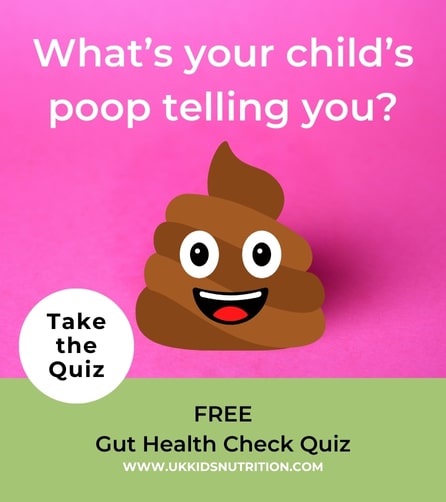
Understanding Constipation in Babies After Starting Solids
Understanding the possible causes of constipation in babies after starting solids can help you take proactive steps to prevent and treat the issue.
It can also help you identify when it’s time to seek medical attention. By following the tips mentioned above, you can help keep your baby’s digestive system healthy and running smoothly.
Furthermore, being informed about baby constipation can also help alleviate your anxiety and worry as a parent.
It’s normal to feel concerned about your baby’s bowel movements, but understanding what’s normal and what’s not can help you feel more confident in your parenting decisions.
How do baby’s stools change when first starting solids?
It’s common for babies to experience changes to their kid poop pattern when transitioning to solid foods.
This is because their digestive system is adapting to processing foods with a bit more texture. Even thin puree of vegetables will have texture and lumps, instead of just liquids like breastmilk, which the body now needs to learn to break down and digest.
During this time, your baby may pass more frequent or loose stools, or their bowel movements may slow down.
Keep in mind that every baby is unique, so there’s no need to worry about any new changes to their bowel movements. Just keep a watchful eye and consult your paediatrician or paediatric dietitian if you have any concerns.
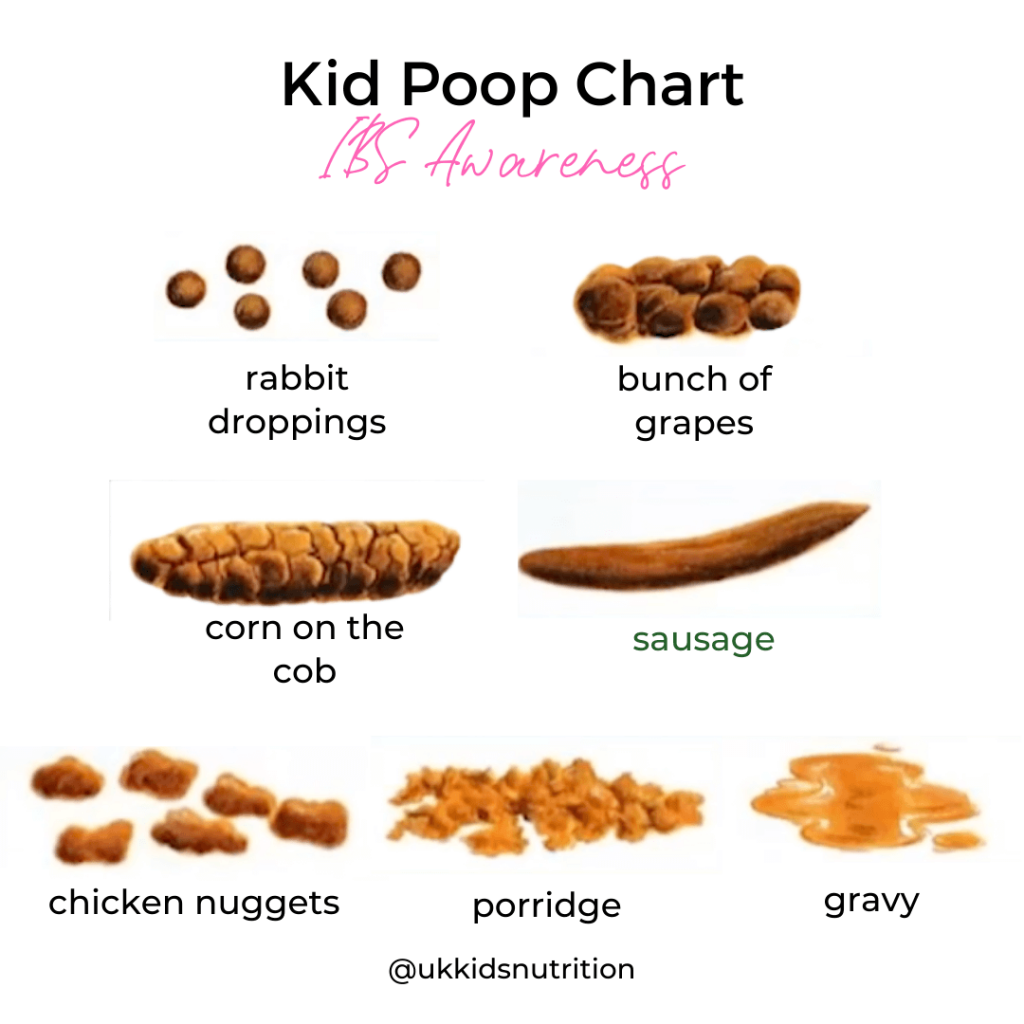
Signs of constipation in babies after starting solids
- Less frequent bowel movements: If your baby has not had a bowel movement in three or more days, they may be constipated.
- Hard, dry stools: If your baby’s stools are hard, lumpy and difficult to pass, this can be a sign of constipation.
- Straining during bowel movements: If your baby is grunting, pushing, or crying during bowel movements, it could indicate constipation.
- Blood in the stool: While this is rare, blood in the stool can be a sign of constipation due to a small tear or another reason. Do speak to your doctor for further guidance.
- Loss of appetite: Constipation can make your baby feel uncomfortable and full, leading to a loss of appetite. Are they starting to feed less than usual?
If you answered yes to any of these points above, then your baby certainly may be constipated.
To treat infant constipation, it’s important to understand the cause of baby constipation.
Possible Causes of Constipation in Babies When Starting Solids
Several factors can cause constipation in babies after starting solids, including:
- Lack of fluids: When your baby first starts eating solid foods, it’s essential to make sure they’re getting enough fluids. Dehydration can lead to constipation, so make sure your baby is drinking enough breast milk, formula, or water. This is particularly important for babies who are over six months of age. When first introducing solids, you can offer cool boiled water with meals to increase their fluid intake.
- Lack of fibre: Introducing high-fibre foods gradually can help your baby’s digestive system adjust. Foods that are high in fibre can help keep your baby’s digestive system running smoothly. This includes all fruits and vegetables such as broccoli, green peas, green beans, cauliflower, apples and pears.
- Underlying non-IgE mediated cow’s milk protein allergy (CMPA): for babies with an underlying CMPA, as they transition from breastmilk to foods with cow’s milk protein in cheese and yoghurt, you might notice that they strain before passing a ‘soft’ stool. Constipation is not the main symptom of delayed milk allergy, so monitor your baby’s bowel movements and other symptoms like reflux, vomiting or diarrhoea. Seek medical advice if you are worried.
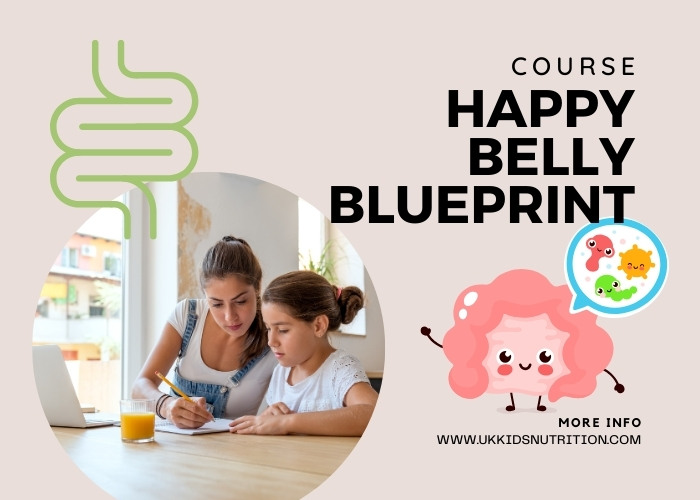
Prevention and Remedies for Baby Constipation After Starting Solids:
To prevent constipation in your baby, here are natural remedies and some tips you can follow:
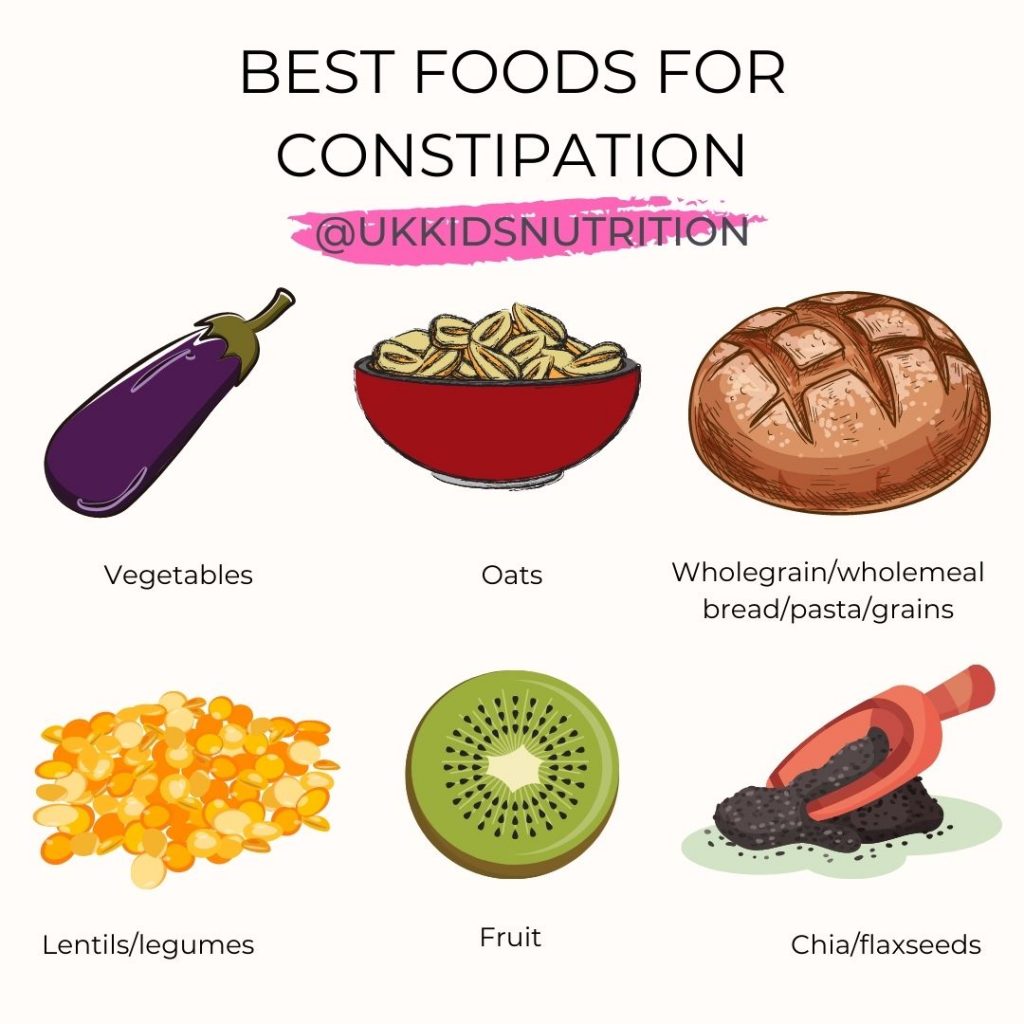
Foods that help with constipation
- Offer plenty of fluids: Make sure your baby is getting enough fluids, including breast milk, formula, or water. If your baby is over 6 months old and has started solids, you can offer water between meals. This can help keep your baby hydrated, particularly in hot weather.
- Introduce foods gradually: Start with small amounts of solid foods and gradually increase the quantity and variety over time. This can help your baby’s digestive system adjust to the new foods when they first start feeding solid foods.
- Offer high-fibre foods: Foods that are high in fibre can help keep your baby’s digestive system running smoothly. This includes fruits and vegetables such as prunes, pears, peaches, broccoli, and sweet potatoes. If your child is constipated, offer these foods in small amounts and gradually increase the quantity (particularly if they start weaning at 4 months and at 6 months).
- Encourage movement: Physical activity can help stimulate your baby’s digestive system and prevent constipation. This can include tummy time, crawling, and playing on the floor.
- Baby massage: try massaging your baby’s tummy in gentle circular movements. Bicycle legs can also help stimulate a constipated baby to open their bowels.
Do bananas cause constipation in babies?
Bananas are an excellent source of fibre and prebiotics, which play a crucial role in maintaining a healthy gut.
Although it may be tempting to avoid bananas if your baby is constipated after starting solids, it’s important to remember that prebiotic foods feed the friendly bacteria in their gut.
For this reason, it’s recommended to introduce a smaller portion of bananas and gradually increase the amount offered.
With patience and consistency, bananas can actually help relieve your baby’s constipation and provide a host of nutritional benefits.
You might also like to read – Are Bananas Good For IBS?
Remedies to solve constipation instantly
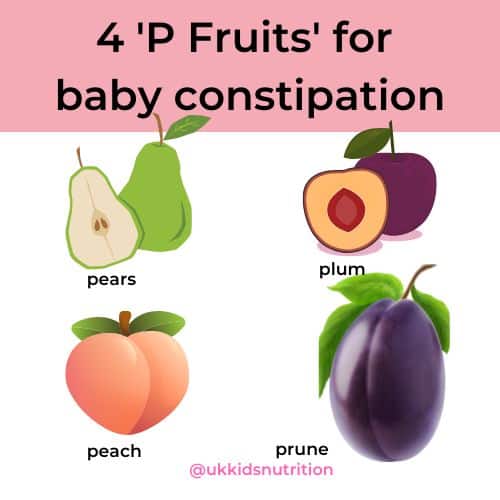
Try giving your baby any of the four ‘P fruits’!
Pear, peach, prune and plum are rich in fibre and sorbitol. Sorbitol is a type of carbohydrate that helps draw fluids into the colon. This helps baby stools remain soft and easy to pass.
Kiwifruit
Kiwifruit is another favourite fruit that I recommend to all of my clients. It’s another excellent source of fibre. The main difference is that the fibre in kiwifruit has a special water-holding capacity.
Read more about kiwifruit in Gold Kiwi or Green Kiwi for Constipation in Children?
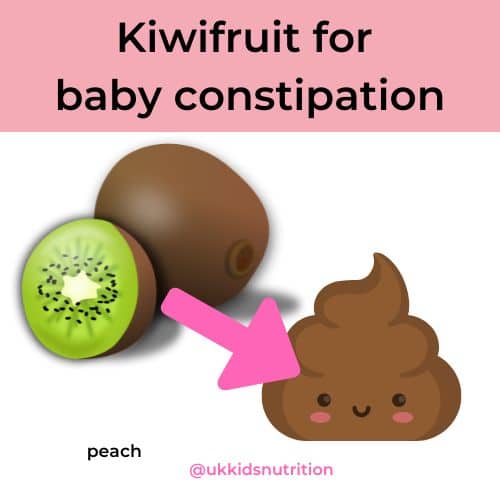
Should I use prune juice to treat constipation in babies?
Prune juice is often used as a natural remedy to alleviate constipation in adults, but can it be given to babies?
While it is generally safe for infants to consume prune juice in small amounts, it’s best to try other remedies, such as increasing fluid intake like water or breastmilk.
It could be that you also need to try incorporating fibre-rich foods into your baby’s diet, which may help to relieve constipation without using juice.
Fruit juice is a source of free sugars so it’s best to offer the whole fruit and water separately.
If your baby is still constipated after trying these preventive measures, it’s time to seek medical attention. Your paediatrician may recommend a stool softener or laxative to help your baby pass stool more easily.
How often should baby poop after starting solids
How often a baby poops after starting solids can vary from one baby to another. Some babies may continue to have frequent bowel movements, while others may experience some irregularity. In general, most babies will have at least one bowel movement per day.
However, it’s not unusual for a breastfed baby to go several days without a bowel movement, especially if they are older than six weeks.
When a baby starts eating solid foods, it’s common for their bowel movements to become less frequent and more formed.
This is because solid foods contain less water and more fibre than breast milk or formula.
As long as your baby is not showing any signs of discomfort or distress, it’s generally safe to wait a few days before becoming concerned about their bowel movements.
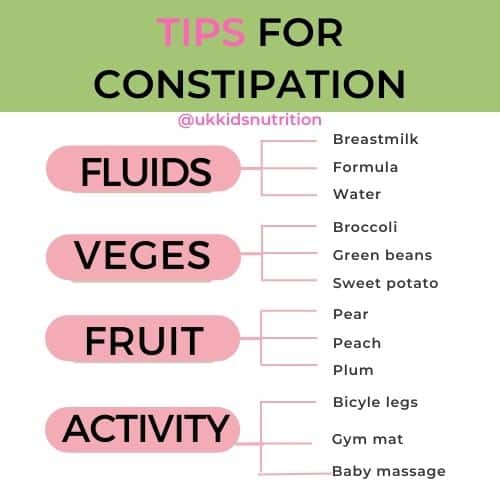
What should baby poop look like after starting solids?
After starting solids, your baby’s poop may change in colour, texture, and frequency.
Ideally, your baby’s poop should be soft, formed, and easy to pass.
The colour may range from yellow to brown to green, depending on what they have started to eat.
However, if your baby’s poop is hard, dry, and pellet-like or they are struggling to pass stool, it may indicate constipation.
If you’re concerned about your baby’s constipation after starting solids, it’s always a good idea to check in with your paediatric dietitian or doctor.
They can assess your baby’s stools and provide personalised advice on how to help keep their digestive system healthy and functioning properly.
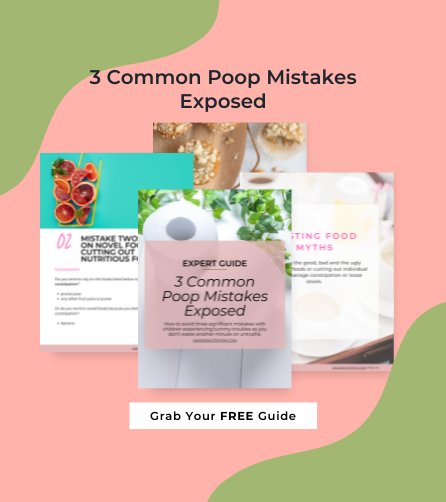
Should I stop solids if baby is constipated?
If your six month old baby is constipated after starting solids, you don’t need to stop giving them solid foods.
Instead, try some of the remedies mentioned earlier in this article, such as offering more fluids and meals based on whole grains and other high-fibre foods.
If you’ve started a new food like eggs, read this post: are eggs low FODMAP?
If constipation persists or your baby shows signs of discomfort or distress, book a single expert video consultation for personalised advice.
When to Seek Medical Attention
While constipation is a common issue, it’s essential to be aware of signs that may indicate a more serious problem.
If your baby has not had a bowel movement for more than three to four days, is in severe pain, has blood in their stool, or is not gaining weight, seek medical attention immediately.
These may be signs of a more severe condition that requires prompt medical attention.
In addition, if your baby’s constipation persists even after trying the detailed remedies in Get Kids Pooping Painfree, it’s time to contact your paediatrician.
Your doctor can evaluate your baby’s condition and determine the best course of action.

The bottom line for constipation
Constipation in babies after starting solids is a common issue that many parents face. While it can be worrying and uncomfortable for both the baby and parents, there are several preventive measures and natural remedies that you can try.
Remember to offer plenty of fluids, introduce foods gradually, offer high-fibre foods, encourage movement, and why not try baby massage?
If your little one’s constipation persists, it’s important to seek personalised advice promptly.
As a parent, understanding the possible causes of constipation in babies and how to prevent and treat it can help you feel more confident in your parenting decisions.
By following the tips mentioned above and knowing when to seek personalised advice, you can help keep your baby’s digestive system healthy and running smoothly.
If you’re still feeling worried about your baby’s bowel movements, consider reaching out to a registered paediatric dietitian.
The Happy Belly Programme is a comprehensive guide to infant and older children’s digestive health that can help you identify and treat simple constipation. Book a discovery call today to get the support you need.
Bahee Van de Bor is a registered paediatric dietitian, specialising in gut health, food intolerance and fussy eating.

Let Me Help
If you’re seeking more personalised guidance or in-depth information, consider exploring my specialized programs and resources:
- Online Course: “Happy Belly Blueprint” – This comprehensive course offers detailed strategies and insights to enhance gut health and solve tummy troubles in children.
- 1-2-1 Programme: “Happy Belly Club” – Tailored for individual needs, this program provides one-on-one support to master the challenges of IBS in kids.
- FREE Guide: Don’t miss out on the valuable insights in “Heal Tummies With Smart Snacks”. Download this free guide to start making positive changes today.
- CHAT With Bahee: Book a free initial consultation to discuss the Happy Belly Club.
Each of these resources is designed to empower you with the knowledge you need to support your child’s gut health.
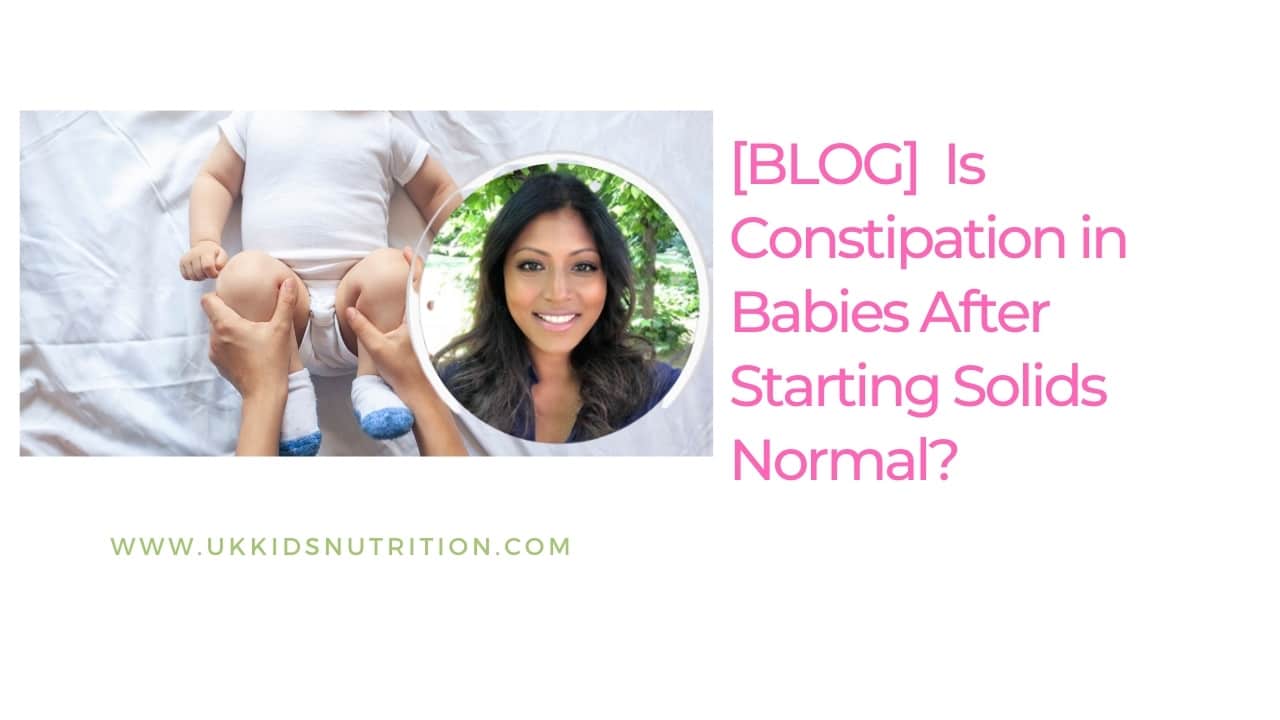
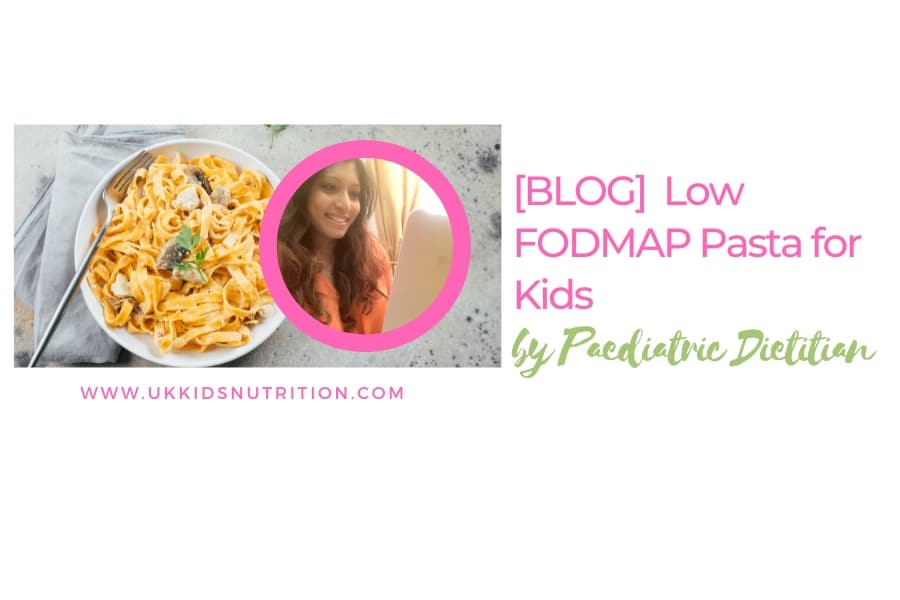

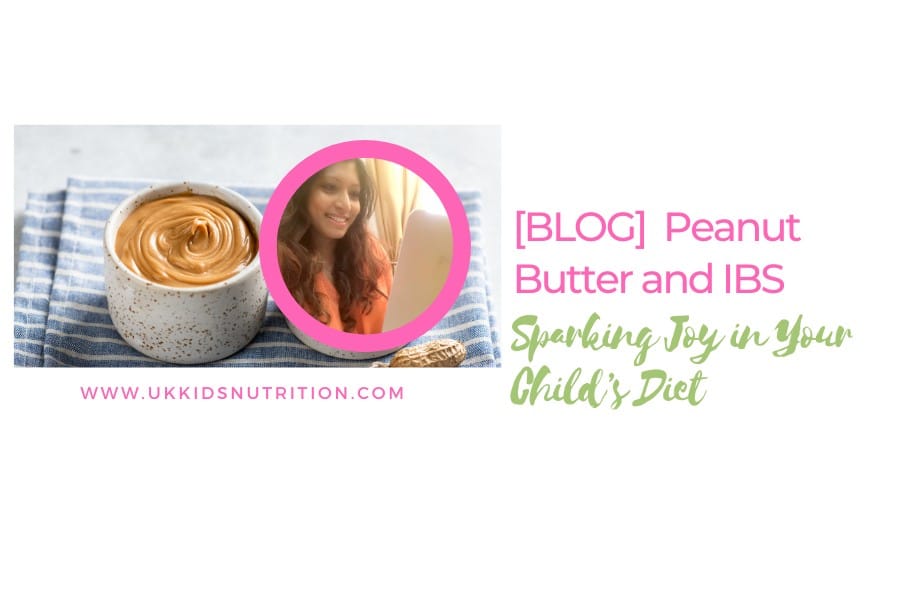
One thought on “Is Constipation in Babies After Starting Solids Normal?”
Thank you for educating and enlightening us. Your article is beneficial to all moms like me. I am happy to learn more from you!